Number Of Detached Pronouns in Arabic With Examples
Arabic detached pronouns vary in form depending on the gender and number of the noun they replace. The gender and number of the detached pronouns in Arabic must agree with the gender and number of the noun.
Advertisements
In this lesson, we will learn the meaning of detached pronouns in Arabic, number of detached pronouns in Arabic, examples, and many more.
Detached Pronouns In Arabic Definition
In Arabic, the detached pronouns are called الضَّمير المُنْفَصِل (ad-damir al munfasil) which means they’re written alone separately from the other words. This pronoun can be in a place of nominative (مَحَلّ رَفْع) or accusative (مَحَلّ نَصْب).
These pronouns are most often the subject of a sentence. Hence they are regarded as marfu’ (nominative case). They are called munfasil because they are pronounced independently.
Read Plural in Arabic
Advertisements
What Are Separate Pronouns In Arabic?
The separate pronoun are الضَّمِيْر المُنْفَصِل (same as detached pronouns). They refer to a person, hence called the personal pronoun.
Number Of Detached Pronouns in Arabic
There are twelve detached (personal) pronouns in Arabic classified into three types: first person, second person, and third person.
These Arabic detached pronouns are divided in two types; the detached pronouns in place of nominative noun, and the detached pronouns in place of accusative nouns.
Recall, pronouns can be classified according to:
Conversation – الْكَلامُ:
Advertisements
- Third-person – الْغَائِبُ
- Second person – الْمُخَاطَبُ
- First-person – الْمُتَكَلِّمُ
Gender -الْجِنْسُ:
- Masculine – المُذَكَّرُ
- Feminine – الْمُؤَنَّفُ
Number – الْعَدَدُ
- Singular – الْمُفْرَدُ
- Dual – المُثَنَّى
- Plural – الْجَمْعُ
The table below summarized all the number of detached pronouns in Arabic.
Advertisements
| Arabic Detached Pronouns | Transliteration | English |
| أنا | ana | I |
| انتَ | anta | you (masc.) |
| انتِ | anti | you (fem.) |
| هو | howwa | he |
| هي | heyya | she |
| Dual | ||
| نحن | naHnu | we (two persons) |
| أنتما | antuma | you (two persons) |
| هما | humaa | they (two people) |
| Plural | ||
| نحن | naHnu | we |
| أنتم | antum | you (masc.) |
| أنتن | antunna | you (fem.) |
| هم | homa | they (masc.) |
| هن | hunna | they (fem.) |
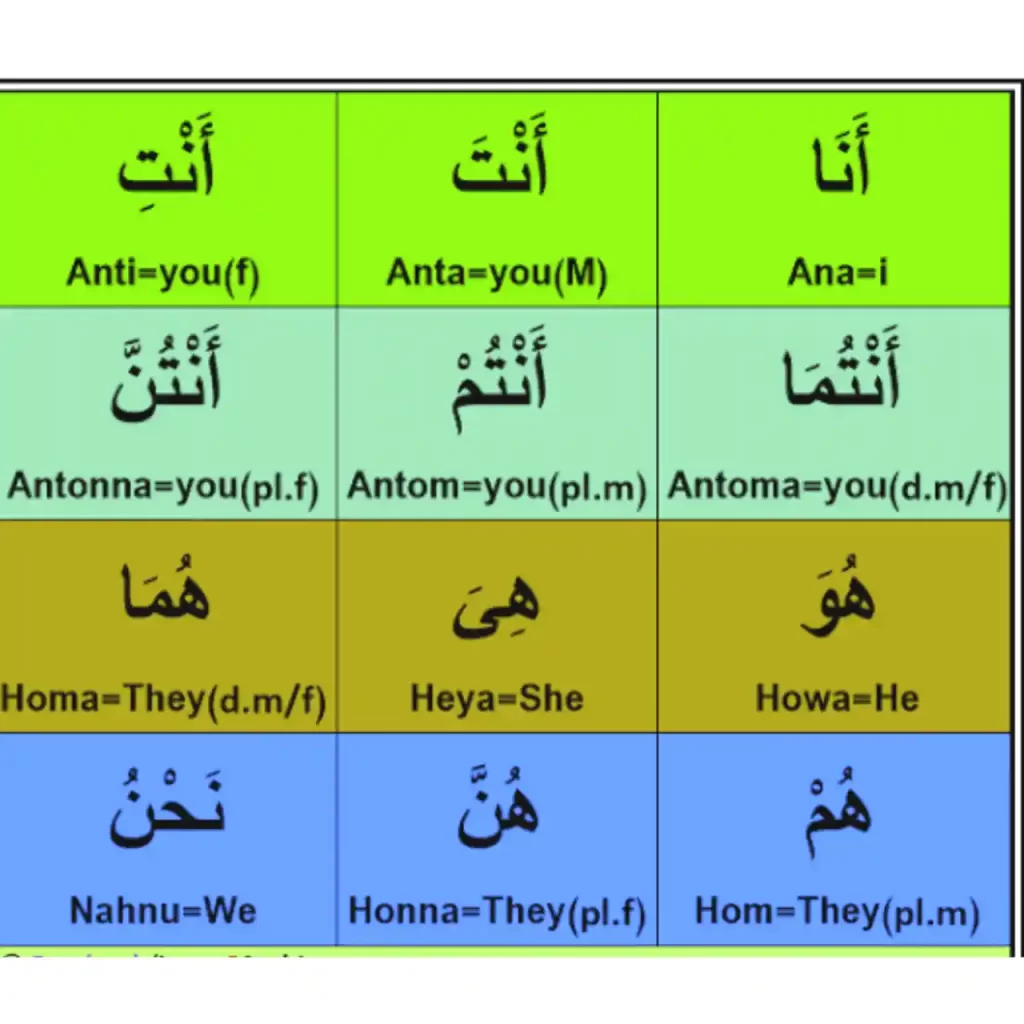
As mentioned above, detached pronouns in Arabic can be only in two places. In practice, there is no set of genitive detached personal pronouns. When the need arises to use these, either the nominative or the accusative separate versions are used.
Nominative Detached Pronouns in Arabic
The nominative detached pronouns are written as ضَّمير الرَّفْع المُنفَصِل and pronounced damir ar-raf’ al munfaŝil.
This type of pronouns occupies the position of the subject in nominal sentence, so they are in place of nominative, but please take care that we say “in place of” nominative noun, and we don’t say that they are in the nominative case; because – as we learnt earlier – the pronouns are indeclinable words.
Only declinable words can be in nominative, accusative, or genitive cases. We can see the full division of these pronouns in the following list:
- I أنا (ana)
- you (masc.) انتَ (anta)
- you (fem.) انتِ (anti)
- he هو (howwa)
- she هي (heyya)
- we نحن (naHnu)
- you أنتما (antuma)
- they هما (humaa)
- you (masc.) أنتم (antum)
- you (fem.) أنتن (antunna)
- they (masc.) هم (homa)
- they (fem.) هن (hunna)
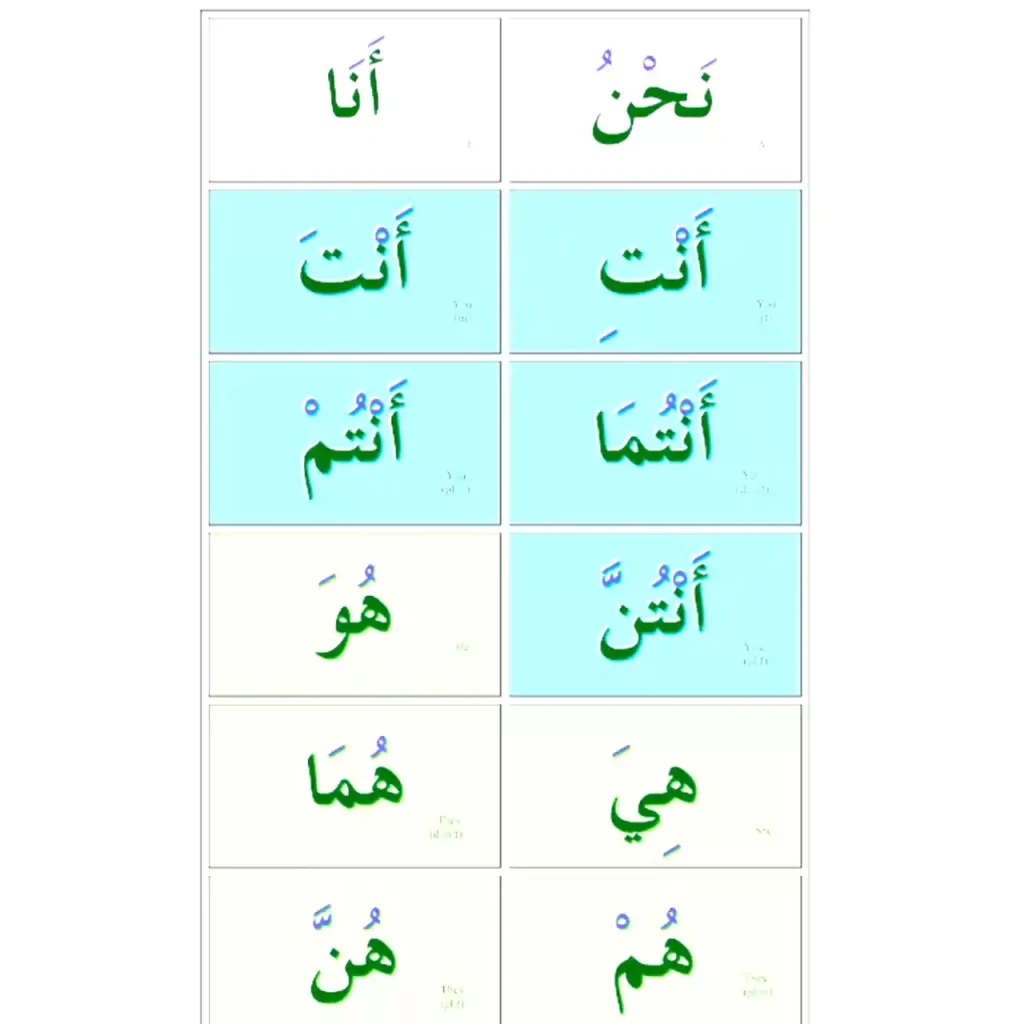
Detached Pronouns in Arabic Examples (Nominative)
Third Person
- This is my father. He is a teacher هَذَا أبِي، هُوَ مُدَرِّس
- This is my mother. She is a doctor هَذِهِ أُمِّي هِي طَبِيبَة
- They (dual) go to the mosque هُما يَذْهَبانِ إلى المَسْجِدِ
- They (dual) are cleaning the house هُمَا يُنَظِّفانِ البَيْتَ
- They are watching the game on TV هُم يُشَاهِدُونَ المُبَاراة فِي التِّلْفاز
- They study in the university هُنَّ يَدْرُسْنَ فِي الْجَامِعَة
Second Person
- Are you a professor? هَلْ أَنْتَ أُسْتَاذٌ؟
- Are you Zaynab? هَلْ أَنْتِ زَيْنَبُ؟
- You both are good players أَنْتُمَا لاعِبانِ جَيِّدانِ
- You (dual feminine)are beautiful children أَنْتُما طِفْلَتَانِ جَمِيلَتانِ
- Are you friends? هَلْ أَنْتُم أَصْدِقاء؟
- You are kind girls أَنْتُنَّ فَتَياتٌ طَيِّبَاتٌ
First Person
- I am Omani doctor أَنا طَبِيبٌ عُمَانِيٌّ
- I am Pakistani nurse أنا مُمَرِّضَةٌ بَاكِسْتَانِيَّة
- We are old parents نَحْنُ أَبَوَانِ عَجُوزَانِ
Accusative Detached Pronoun In Arabic
The accusative detached pronoun are called ضَّمير النَّصْبِ المُنفَصِل. We have to notice that the detached accusative pronoun should NOT come in place of nominative or genitive. It must occupy a place of accusative only.
The detached accusative pronoun is obligatorily used when it is not possible to use the attached pronoun. This happens in different situations as follows:
The first situation of specification, e.g.
إيَّاكَ نَعْبُدُ وَإِيَّاكَ نَسْتَعِينُ
(it is you, we adore, and it is you, we ask help).
The intention of placing the pronoun first in such case is to specify the meaning of the composition. That specification cannot be expressed by using the attached pronoun.
The second situation is when we need to put the accusative pronoun after certain particles that it is not allowed to attach the pronoun to, e.g. the particle Wa:
شَفَاكُمُ اللهُ وَإِيَّانَا
(Allah makes you healthy and us!).
In this example we cannot put the attached accusative pronoun after the particle Wa.
We use the detached pronoun alternatively with attached accusative pronoun, when there is another attached pronoun connected to the same verb as a direct object, that make the pronunciation hard, e.g.
أَعْطَيْتُكَ إيَّاهُ
(I gave it to you) instead of أَعْطَيْتُكَهُ.
Now let’s see in the following table the full division of the detached pronouns in place of accusative:
| Arabic Pronouns | Transliteration | English |
| إِيَّايَ | Iyaaya | It’s I |
| إِيَّاكَ | Iyaaka | It’s you (masc.) |
| إِيَّاكِ | Iyaaki | It’s you (fem.) |
| إِيَّاهُ | Iyaahu | It’s he |
| إِيَّاها | Iyaaha | It’s she |
| Dual | ||
| إِيَّانَا | Iyaanaa | It’s we (two persons) |
| إِيَّاكُمَا | Iyaakuma | It’s you (two persons) |
| إِيَّاهُمَا | Iyaahumaa | It’s they (two people) |
| Plural | ||
| إِيَّانَا | Iyaanaa | It’s we |
| إِيَّاكُمْ | Iyaakum | It’s you (masc.) |
| إِيَّاكُنَّ | Iyaakunna | It’s You (fem.) |
| إِيَّاهُمْ | Iyaahum | they (masc.) |
| إِيَّاهُنَّ | Iyaahunna | they (fem.) |
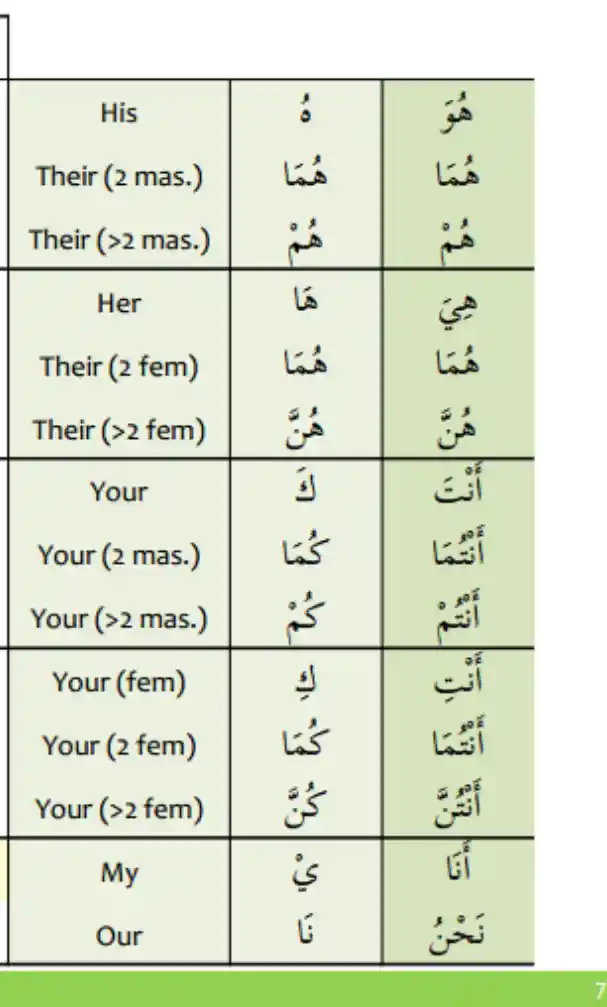
Detached Pronouns Examples (Accusative)
- This bag, I’ll give it to you هَذِهِ الْحَقِيبَةُ سَأُعْطِيكَ إِيَّاهَا
Here we used the separate pronoun facultatively because it is easier in pronunciation than سأعطيكها
- It is you, I mean by this word إِيَّاكُمَا أَعْنِي بِهَذِهِ الْكَلِمَةِ
Here the direct object pronoun precedes obligatorily the verb for rhetoric reason.
- The teacher awarded me and you الْمُدَرِّسُ كَافَأَنِي وَإِيَّاكَ
Here the direct object pronoun is preceded by Wa.
More Pronouns Lessons
Conclusion
The detached pronouns in Arabic are fairly easy to learn as there aren’t as many variations to them in comparison to the conjugation of different verbs in Arabic. Once you learn these rules, you will be able to use them in your speech, writing and reading without worry.
Advertisements

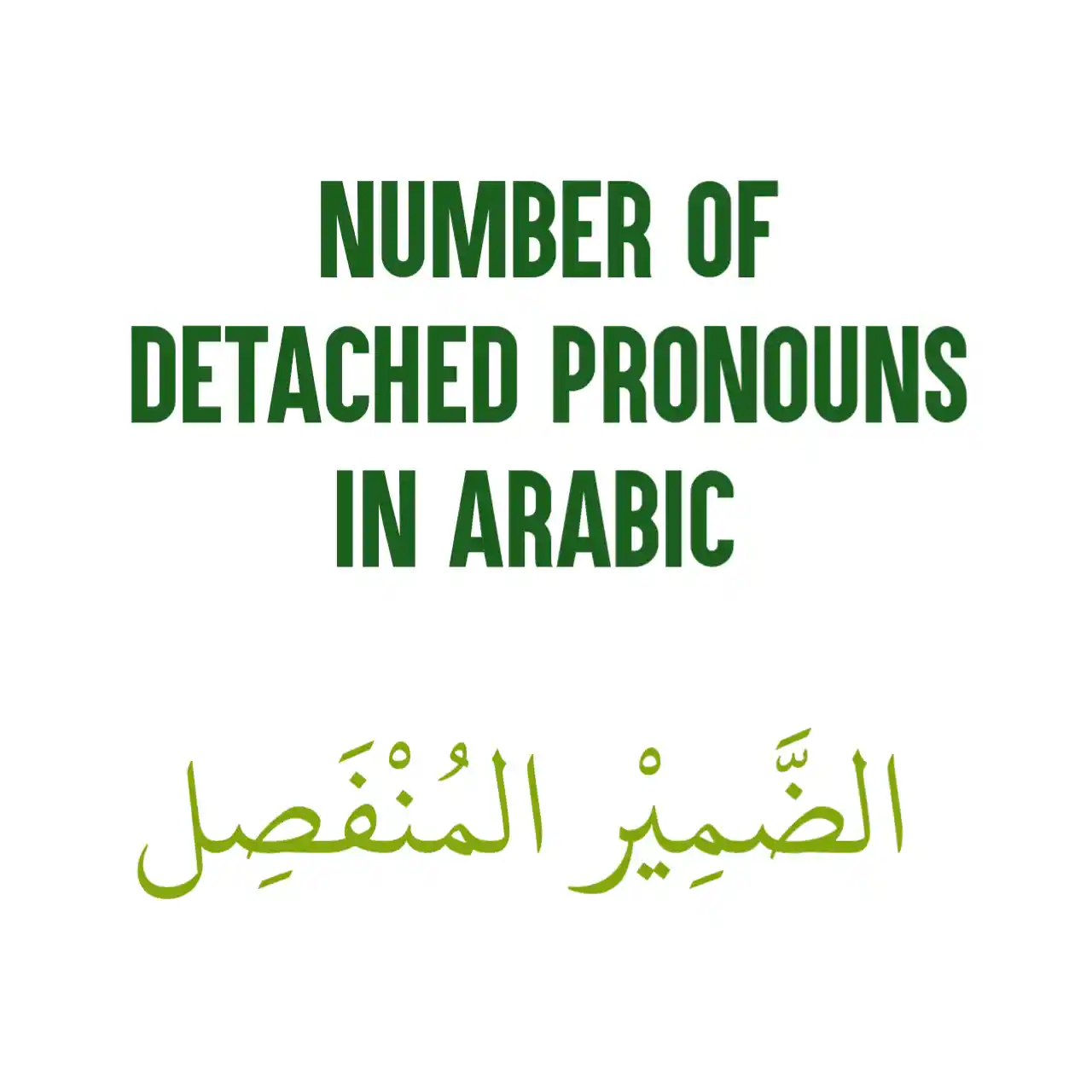

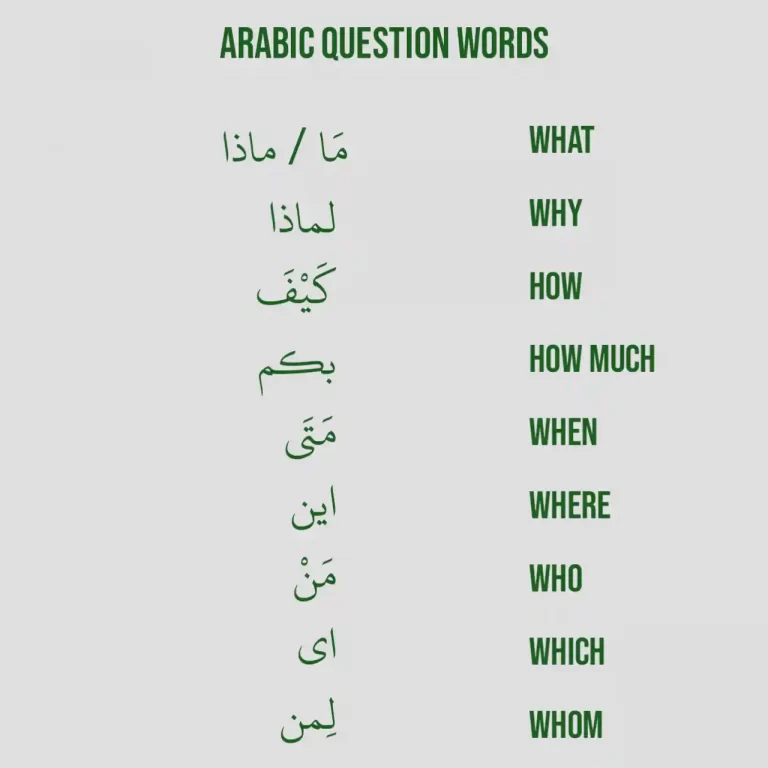
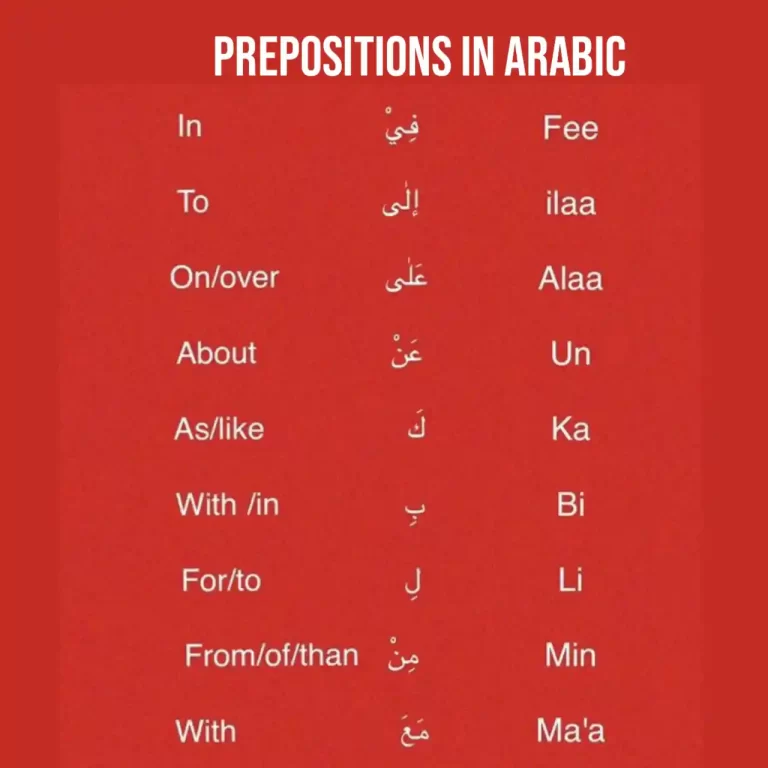

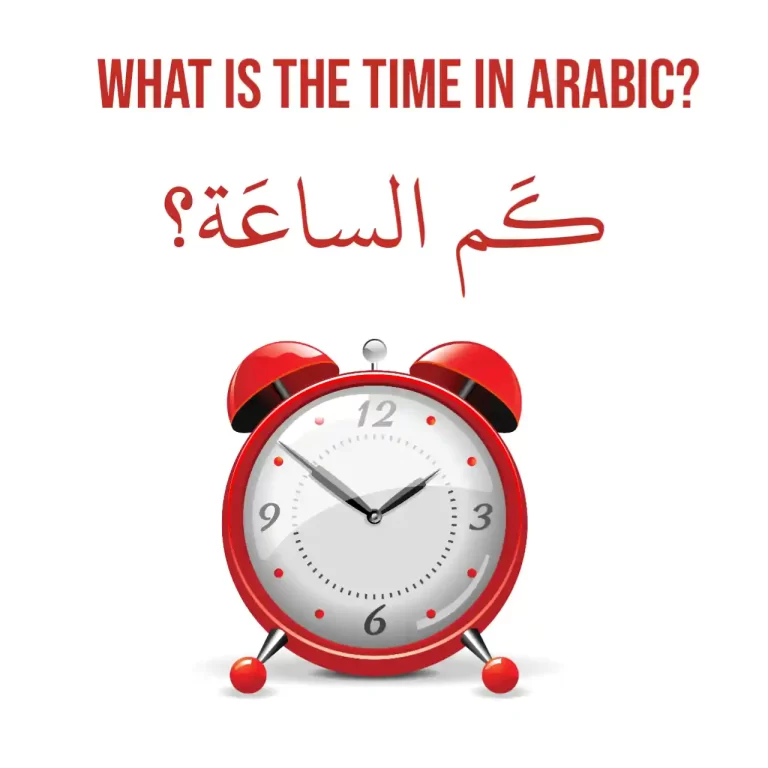

One Comment